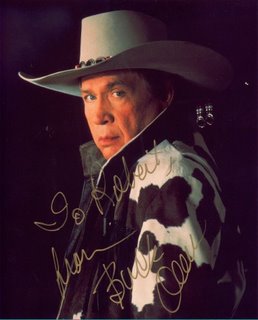I have a confession to make.
But first let's pay tribute to a great man who passed away over the weekend, Mister Alvis Edgar Owens. Better known as Buck.
This is the kind of man I am: I decided when I was about 12 years old what I thought was cool -- baseball, comic books, country music and girls with dark hair and dark eyes. And I never changed my mind about that. That's still what I think is cool.
My first exposure to country music was subliminal. There was a radio station in the small North Carolina town I grew up in that played pop music all day long, but switched to a country format sometime around midnight. I would fall asleep listening to the Grass Roots and Badfinger and Bobby Sherman but wake up with Conway Twitty, Charley Pride and Waylon Jennings. My classmates fell asleep listening to the radio like I did, but they were horrified at the hillbilly wailing they heard in the morning. I, on the other hand, was entranced. I loved country music and never felt like I had to choose between rock and rockabilly, I just enjoyed it all.
Buck Owens had a syndicated TV show back then that I have not seen mentioned in any of the obits of the Bard of Bakersfield, but I know I didn't dream it. I used to watch it every Saturday night at 10:30. I have to say that although I enjoyed Buck's music he was never one of my favorite singers, and one of the reasons I watched the show was to try and figure out what the hell was up with his lip. Was that a scar or a harelip or what? (Even after watching him for years on Hee-Haw, I still don't know for sure, but I'm guessing scar.)
Single-handedly (and later with some help from Merle Haggard, who started out as a bass player in Buck's band the Buckaroos, before stealing his boss's wife Bonnie Owens) Buck invented a new style of country music named after his adopted hometown of Bakersfield, California. He had a string of hits in the 1960's. But he is probably best known today as the co-host (along with Roy Clark) of the TV show "Hee-Haw!". According to the New York Times Buck had mixed feelings about the success of that show: he thought the persona of "country rube" he wore on that show destroyed his album sales. But I really think that was his persona before "Hee-Haw!" I mean while Haggard was singing about hard times in songs like "Working Man Blues" and "If We Make it Through December" Buck was singing "I've got the hungries for your love, and I'm waiting in your welfare line." While Johnny Cash compared falling in love to being engulfed in a ring of fire, Buck said it was more like having a tiger by the tail. Not a novelty act but certainly more light-hearted than a lot of his contemporaries.
(Although in fairness, it must be said that "Act Naturally" and "Crying Time" were great enough to be covered by, respectively, the Beatles and Ray Charles.)
And here's my confession: when I learn that someone I admire has died, my first thought is compassion for their family. But it's followed closely by "Do I already have his (or her) autograph?" I know that sounds horrible, but in my defense I must say that I always tell the autographer how much I appreciate their work, and I'm glad I got to do that while they were still alive. I mean, I wish I had thanked Don Knotts for being Barney Fife, whether I got his signature or not.
Fortunately, in Buck's case, I did get a chance to thank him for the music and to get his autograph.







